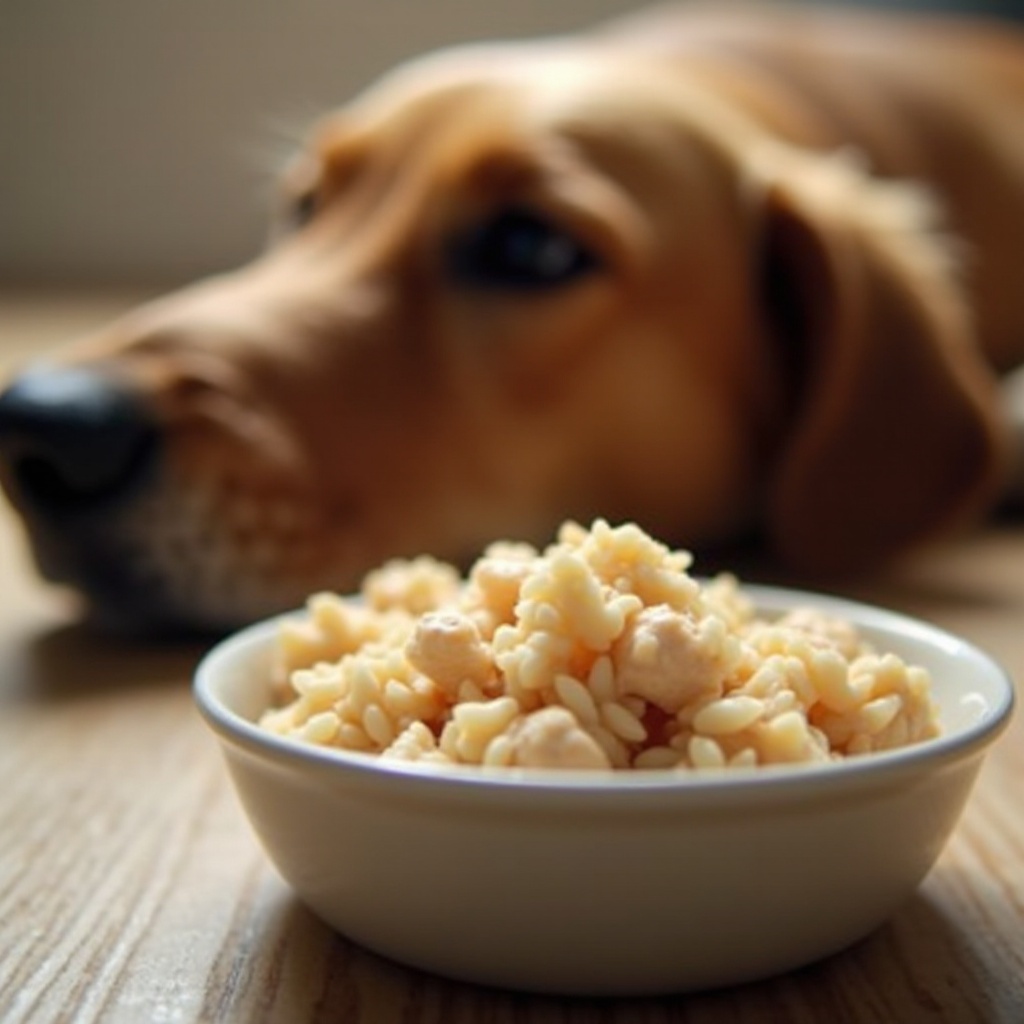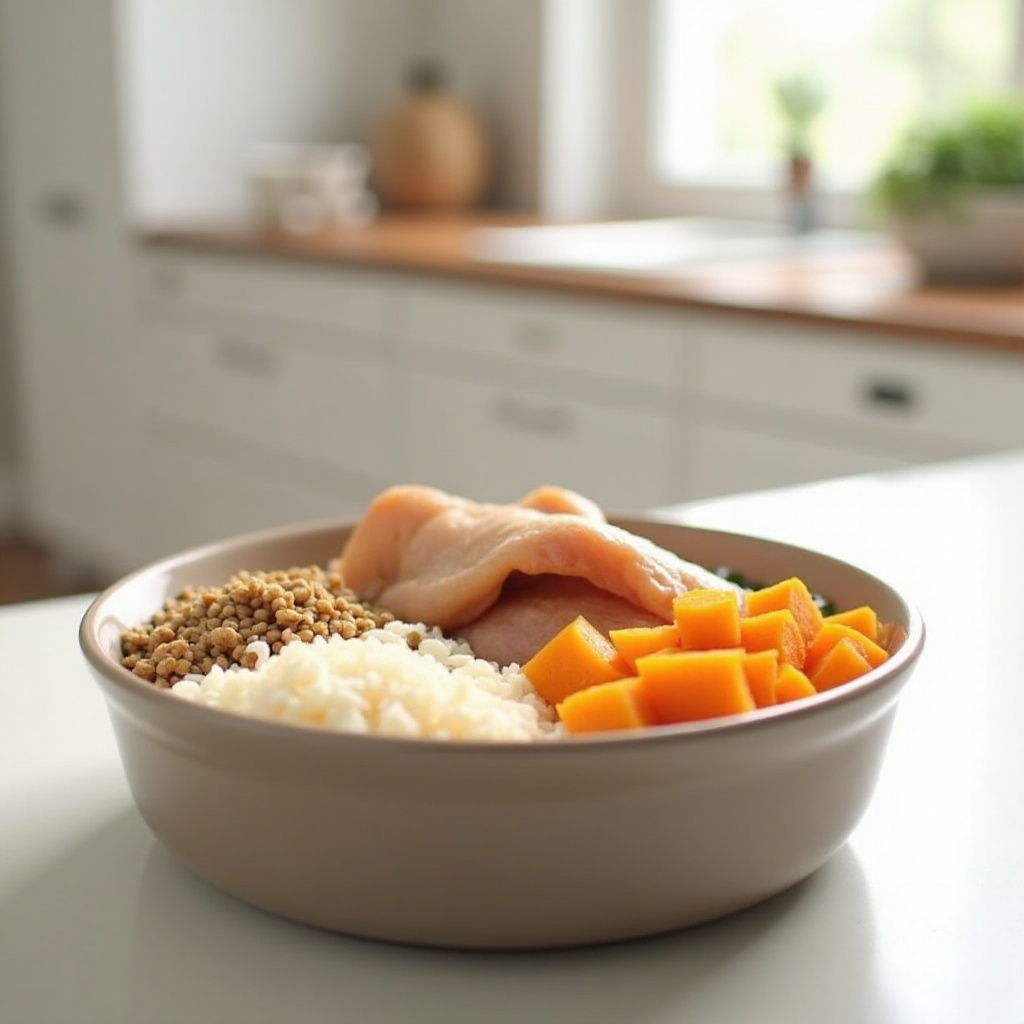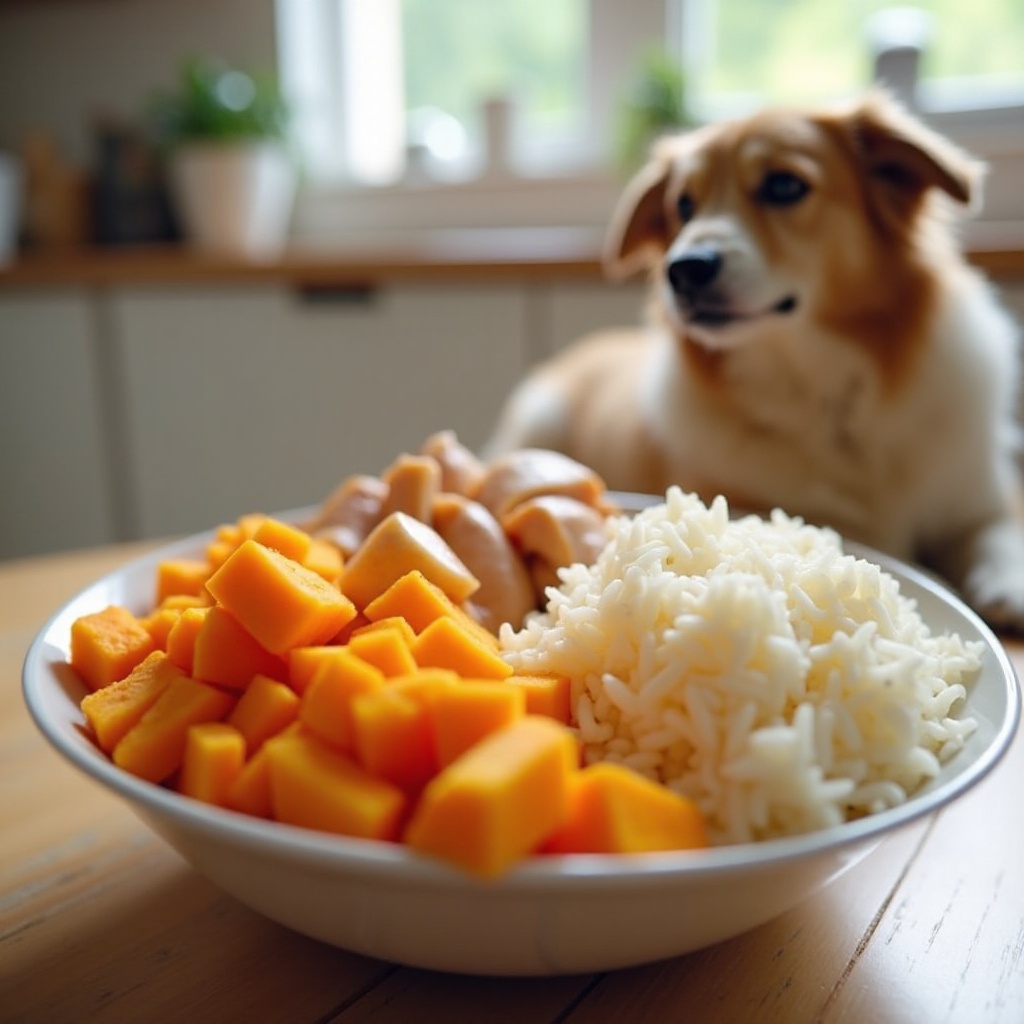Introduction
Diarrhea in dogs can be distressing for both the pet and the owner. It’s essential to know how to address this problem effectively to ensure your furry friend’s well-being. The right diet plays a significant role in managing and alleviating diarrhea. This article will explore the best foods for dogs suffering from diarrhea, including key ingredients to look for and top recommendations for both commercial and homemade options. Additionally, we will provide practical tips for feeding a dog with diarrhea and touch on when to consult a vet.

Understanding Dog Diarrhea
Dog diarrhea can occur for various reasons, ranging from dietary indiscretion to more severe health issues. It is crucial to understand the common causes and symptoms to identify the best course of action.
Common Causes of Diarrhea in Dogs
Diarrhea in dogs can be triggered by several factors, including:
– Dietary changes: Switching dog food brands or types too quickly.
– Food intolerances: Some dogs are intolerant to specific ingredients like dairy or grains.
– Infections: Bacterial, viral, or parasitic infections can cause diarrhea.
– Medications: Certain medications might upset a dog’s stomach.
– Stress: Changes in the environment or separation anxiety can lead to digestive issues.
Symptoms to Watch For
It’s imperative to monitor your dog closely when they are experiencing diarrhea. Symptoms to watch for include:
– Frequent loose stools: More than three in a short period.
– Straining to defecate: Indicates possible discomfort or inflammation.
– Presence of blood or mucus: Could signify a more serious condition.
– Vomiting: Often accompanies diarrhea and increases the risk of dehydration.
– Lethargy and loss of appetite: Suggests your dog may be feeling unwell overall.
Understanding these causes and symptoms will help you make an informed decision about your dog’s diet and when to seek professional help.
Key Ingredients to Look For in Dog Food
Choosing the right food for a dog with diarrhea involves selecting ingredients that won’t further irritate the digestive system.
Easily Digestible Proteins
Opt for proteins that are gentle on the stomach, such as:
– Boiled chicken: Lean and easy to digest.
– Turkey: Another lean protein that’s easy to absorb.
– Fish: A good option for dogs with chicken or beef allergies.
Carbohydrates That Soothe the Gut
Carbohydrates can act as a binding agent to firm up stools. Look for:
– Rice: Plain and cooked, it’s gentle on the stomach.
– Pumpkin: Rich in fiber, helps regulate digestion.
– Sweet potatoes: Offers a balance of nutrients and fiber.
Probiotics and Prebiotics
Probiotics can help restore gut flora and include:
– Yogurt: Non-fat and plain, rich in good bacteria.
– Supplemental powders: Specifically designed for dogs, easy to mix with food.
Prebiotics feed good gut bacteria and include:
– Bananas: Mild and gentle, also offer a soothing effect.
– Oats: In small amounts, can support digestive health.
With these essential ingredients, you can choose a well-balanced, soothing diet for your dog.

Top 5 Best Foods for Dogs with Diarrhea
After understanding the key ingredients, let’s delve into some top commercial dog food recommendations that help manage diarrhea effectively.
Food 1: Hill’s Science Diet Adult Sensitive Stomach & Skin
Description: Designed for dogs with sensitive digestive systems.
Benefits:
– Easily digestible ingredients support better nutrient absorption.
– Contains prebiotic fiber to support a balanced gut microbiome.
Ingredients:
– Chicken, brewers rice, chicken meal.
– Omega-6 fatty acids and Vitamin E for skin health.
Food 2: Royal Canin Veterinary Diet Gastrointestinal Low Fat
Description: Specifically formulated for dogs with sensitive gastrointestinal systems.
Benefits:
– Low-fat content to ease digestion.
– Contains prebiotics for digestive health.
Ingredients:
– Chicken by-product meal, brewers rice, rice hull.
Food 3: Blue Buffalo Basics Limited Ingredient Diet
Description: Limited ingredients reduce the risk of food sensitivities.
Benefits:
– Single animal protein source.
– Easily digestible carbohydrates.
Ingredients:
– Deboned turkey, pea starch, peas.
Food 4: Purina Pro Plan Vet Diets EN Gastroenteric Formula
Description: A veterinary diet tailored for sensitive digestive health.
Benefits:
– High digestibility to support nutrient absorption.
– Low-carb content to ease the stomach.
Ingredients:
– Chicken by-product meal, corn grits, wheat gluten.
Food 5: Wellness Simple Limited Ingredient Diet
Description: Focuses on simplicity and lack of common allergens.
Benefits:
– Limited, wholesome ingredients.
– Single protein source for better digestion.
Ingredients:
– Deboned turkey, turkey meal, potatoes.
These commercially available options provide balanced nutrition specifically designed to support dogs with diarrhea.

Homemade Food Options
For a more hands-on approach, homemade recipes can be just as effective. Transitioning to homemade options can also allow more control over what your dog consumes.
Recipe 1: Pumpkin and Rice
Ingredients:
– 1 cup canned pumpkin (plain).
– 1 cup cooked white rice.
Instructions:
1. Mix pumpkin and rice until well combined.
2. Serve in small portions.
Recipe 2: Boiled Chicken and Carrot
Ingredients:
– 1 cup boiled, shredded chicken.
– 1/2 cup cooked, mashed carrots.
Instructions:
1. Combine the chicken and carrots.
2. Serve in small amounts.
Recipe 3: Sweet Potato Mash
Ingredients:
– 1 cup cooked, mashed sweet potato.
Instructions:
1. Ensure the sweet potato is thoroughly mashed.
2. Serve in small portions.
These simple, homemade recipes are gentle on your dog’s stomach and easy to prepare.
Tips for Feeding a Dog with Diarrhea
Handling a dog’s sensitive stomach requires a careful approach. Here are some tips to ensure their diet is beneficial when they have diarrhea:
- Small Portions: Serve smaller, more frequent meals to avoid overloading the digestive system.
- Hydration: Ensure your dog has access to clean, fresh water at all times.
- Gradual Introduction: Introduce any new food slowly to avoid upsetting their stomach further.
When to Consult the Vet
If diarrhea lasts more than 48 hours or if you notice severe symptoms like continuous vomiting, lethargy, or blood in the stool, it’s crucial to consult a vet. Rapid intervention can prevent more serious health issues.
Conclusion
Addressing diarrhea in dogs involves understanding the symptoms, choosing the right foods with key ingredients, and considering both commercial and homemade options. Always monitor your dog’s condition closely and consult a vet when necessary. By following these guidelines, you can effectively manage your dog’s diarrhea and ensure their overall health.
Frequently Asked Questions
Can I feed my dog regular food when they have diarrhea?
No, regular food might aggravate the condition. Use easily digestible and bland foods.
How long should I wait before consulting a vet?
If diarrhea persists for more than 48 hours or is accompanied by severe symptoms, consult a vet immediately.
Are there any foods to avoid completely?
Yes, avoid fatty, spicy, or highly-seasoned foods as they can trigger digestive issues.
